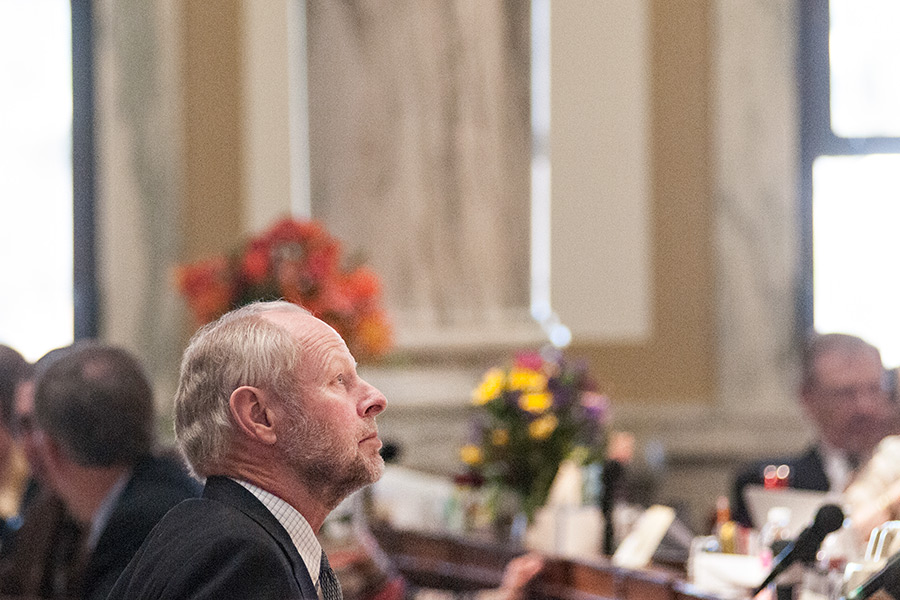Although conservative Republicans in the Flathead Valley held serve against their moderate opponents in the June 7 primary, the moderate bloc made small gains across the state, and the governing majority of so-called “business-minded” Republicans will likely retain a similar balance of power that’s emerged in the previous two sessions.
The state legislative primaries featured a host of Republican contests as the splintered GOP battled for control over Montana’s Legislature, laying stake to what has become an intraparty fight for the GOP’s core. The moderate and conservative branches of the GOP faced off in 10 Senate races and 26 House races.
Those outcomes will help determine what happens when next year’s Legislature convenes in terms of policy outcomes. In 2015, about a dozen moderate Republicans joined 41 Democrats to pass key legislation like Medicaid expansion, campaign-finance reform and the Flathead tribal water compact.
This election cycle, voters in Gallatin County ousted conservative state Rep. Art Wittich from office, while Rep. Randy Pinocci lost his seat to Rep. Windy McKamey, a moderate who shifted districts to unseat her more conservative rival.
In the Flathead Valley, other well-known conservatives prevailed; because they will head to the general election in distinctly Republican districts, it’s likely they’ll head to Helena next year.
In Senate District 3, Rep. Keith Regier, R-Kalispell, the current House Majority Leader, edged out Don “K” Kaltschmidt in one of the most talked-about races in the state. Meanwhile in House District 11, conservative Republican Derek Skees, a member of the House for one term from 2011 to 2013, beat his primary opponent, Republican Jean Barragan.
Both races came down to narrow margins, but the vote counts handed decisive victories to Regier — who is termed out in the House — as well as Skees.
Regier is set to face Democrat Melissa Hartman in the fall, while Skees will go up against Democrat Eileen Bach Bech.
“There were some slight gains made by the moderate Republicans and I think that will strengthen their hand a little bit, but not a huge amount,” said Rob Saldin, political science professor at the University of Montana. “In the past couple of cycles the governing majority has been the moderate Republicans crossing lines to negotiate with Democrats. That governing majority is probably going to be in place again, and if anything it will have grown a little bit stronger. So the conservatives will probably not be able to move their agenda.”
Voter turnout was higher than usual for a primary race, with more than 44 percent of registered voters casting ballots, according to the Secretary of State’s Office. That’s a departure from the 37 percent four years ago.
About 80 percent of the 249,000 absentee ballots sent out were returned, accounting for about 70 percent of all votes cast, which the Secretary of State’s Office counted as a record.
Groups like Montanans for Responsible Leadership and the Montana Contractors Association spent big to turn out the vote for moderates.
Conservatives will continue to try to steer the agenda, but moderates made some inroads, said Sandy Welch, the deputy treasurer for Montanans for Responsible Leadership.
Despite a moderate faction of the GOP stepping away from party leadership to pass contentious Legislature in 2015, Regier led the charge against accepting the state’s sprawling infrastructure bill, standing by his caucus to reject a public works bill that called for $150 million in cash, bonding and borrowing authority to finance a slate of public-works projects, as well as construction of new state buildings on college campuses and elsewhere.
Republicans like Regier wanted less borrowing and more cash, while Democrats, led by Gov. Steve Bullock, said the bill struck a balance that demonstrated sound fiscal responsibility.
Both Bullock and the Republican challenger for the governor’s seat, Greg Gianforte, have said that infrastructure will be a top priority, and Saldin said the minor shift in the Legislature’s makeup could give the measure more momentum toward final passage.
“Bullock and Gianforte have both been talking a lot about this in their campaigns, and if anything infrastructure will have a stronger coalition this time in the Legislature, one way or another,” Saldin said.
